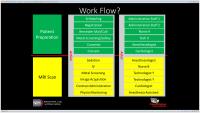Overview
This course will provide an overview of the logistics of imaging
children and newborns, suggest possible solutions, and review best
practices. It will then provide an introduction to dedicated pediatric
imaging technology, and review recent developments in RF coil technology
and pulse sequence acceleration techniques for improved pediatric and
neonatal imaging. The course will conclude with an overview of both body
and cardiac pediatric MRI.Target Audience
Investigators who will benefit from learning about the logistics
associated with pediatric and neonatal MRI, new MRI techniques for
improved pediatric and neonatal imaging, and the current
state-of-the-art in body and cardiac pediatric imaging.
Educational Objectives
Upon completion of this course, participants should be able to:
- Apply logistical best
practices for pediatric and neonatal MRI;
- Describe new MRI technologies
for dedicated pediatric imaging, and new RF and pulse sequence
acceleration strategies that could benefit pediatric and neomnatal
MRI; and
- Identify current MRI techniques with application to both
body and cardiac pediatric imaging.
|
09:00
|
 |
Logistics of Imaging Children 
Kendall O'Brien1 and
Jonathan Swink2
1Cardiology, Children's National Health
System, Washington, DC, United States, 2Anesthesia,
Children's National Health System, Washington, DC,
United States
what happens to old when I type new
yup
|
09:30
|
|
Technologies for Pediatric Neuroimaging 
Duan Xu1,2
1Department of Radiology and Biomedical
Imaging, University of California San Francisco, San
Francisco, CA, 2Joint
Graduate Group in Bioengineering, UCSF/UC Berkeley, San
Francisco and Berkeley, CA, United States
This educational session will introduce technologies for
brain imaging of pediatric subjects. A brief overview
of key differences between the developing brain and
adult brain will be discussed. The presentation will be
focused on the variety of neuroimaging sequences,
anatomical and functional, and post-processing
techniques for improved characterization of the maturing
brain. Translational studies will also be presented to
highlight the importance of advancing pediatric brain
imaging not only in research but also in clinical care,
and further identify the area of needs to spur interests
from the audience.
|
10:00
|
|
Coils & Acceleration
Michael Lustig1
1UC Berkeley
|
10:30
|
|
Break & Meet the Teachers |
11:00
|
|
Pediatric Imaging 
Shreyas Vasanawala
MRI is an outstanding modality for pediatric body
imaging, and offers the prime advantage of lack of
ionizing radiation. However, it is often under-utilized
due to challenges with patient cooperation and reliable
image quality. Many of these issues stem from motion
artifacts and bloated protocols. This presentation will
cover common imaging indications in the extremities,
pelvis, abdomen, and chest, providing streamlined
protocols for each. Several methods for rapid
musculoskeletal imaging will be reviewed. These include
targeted protocols and higher-dimensional acquisitions.
An approach to abdominal and pelvic MRI will be
presented that uses only a couple of sequences to obtain
T2-weighted and post-contrast T1 weighted scans.
Tradeoffs between various methods of T2 weighted imaging
will be reviewed. Further, for MRA and MR venography of
the torso, streamlined protocols will be presented that
are well-suited to sedated children. Contrast-enhanced
imaging techniques that minimize motion will be
presented.
|
11:30
|
|
Cardiac 
Vivek Muthurangu
Paediatric cardiac disease is often complex, requiring
comprehensive anatomical and hemodynamic assessment. C
Paediatric cardiac disease is often complex, requiring
comprehensive anatomical and hemodynamic assessment.
Cardiac MRI offers a reference standard method of
assessing the cardiovascular system. However,
conventional cardiac MRI can be difficult to perform on
children due to poor patient compliance. Therefore,
accelerated real-time imaging techniques are
increasingly used. These will be discussed with
particular reference to studies that have demonstrated
proven benefit in the pediatric population.
|
12:00
|
|
Adjournment & Meet the
Teachers |
|

